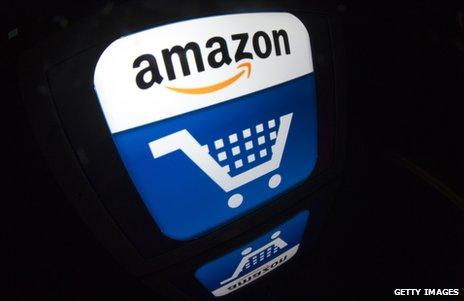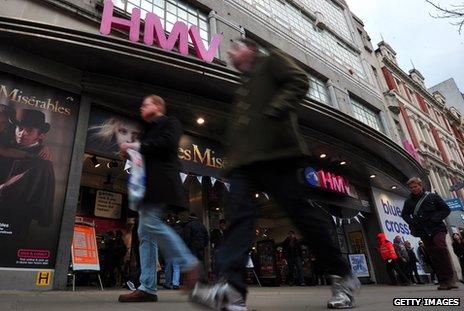Amazon advances with Autorip - who can compete?
- Published
- comments

Where and how do you buy music these days?
If it's a CD or vinyl, you've a choice between a high street store or an online retailer like Amazon. If it's a digital download, you're most likely to be buying it from iTunes.
Now Amazon is launching a service designed to make it a one-stop shop for physical and digital music products. And that raises the question - why on earth have its rivals sat and watched this happen?
Amazon's new AutoRip service means that whenever you buy a CD or a vinyl album you also get free mp3 versions. What is more, customers who have bought physical music from the online retailer in the past will find that it is now all available in digital form in Amazon's CloudPlayer.
This could be rather scary - Amazon started selling CDs in the UK back in 1999, and you may find the evidence of your past musical tastes rather distressing.
But how attractive will this feature really be? You might think most music fans were rapidly abandoning CDs for digital downloads, so that this kind of hybrid service would soon be irrelevant.
Paul Firth, head of music for Amazon UK, tells me he's confident there is a large body of consumers for whom Autorip will be attractive. The company still shifts a lot of CDs, and the sales are growing in the UK, which means that it has a growing share of a shrinking market.
In the US, where the service has been live since January, it has helped grow sales - those CDs which are licensed for Autorip are selling faster than those that aren't.
"It gives us a better customer offer," says Mr Firth."We're uniquely placed to offer people the chance to listen to what they want across both physical and digital."
So an American business which is already the dominant force in book retailing in the UK, both physical and digital, is now bidding to carve out a big slice of the music market too. Of course another American firm, Apple, will have plenty to say about that - but it's worth asking why no British retailer is in the running.
We have some of the world's most successful artists, and a great music culture , but we've failed to develop a company that could adapt to the digital age and rival Apple and Amazon in the business of selling music to consumers.
There was one obvious candidate. Back in the mid-90s when Amazon got underway, this UK firm was a retail powerhouse, selling music, videos and books, and with ties to a major music label.
It continued to grow into the next decade, and while it was somewhat slow to spot the threat from digital competition, it did then launch a major drive to modernise the way it engaged with consumers, as explained in the company's 2008 Annual Report: "As digital delivery becomes a reality across a wider range of our product categories," it said, "we are now poised to grow faster."
That company was HMV, which went into administration in January this year. Sadly its various efforts at selling music online or offering downloads with physical purchases to selected customers were too little, too late, and never added up to a coherent digital strategy.

HMV - a wasted opportunity?
For too long, the company focussed on holding on to what it had - a profitable high street operation - rather than advancing onto new territory. Of course, in that HMV is far from alone.
Worldwide, the incumbents in all kinds of industries threatened by digital disruption have gone through a cycle of complacency followed by mild concern and then panic - look at Kodak and its reaction to digital photography.
And some would point to another reason why American web giants can prosper at the expense of home-grown businesses. Amazon, as we've all heard recently, is among those companies making use of perfectly legal tax avoidance measures to reduce its corporation tax payments to just £2.4m last year.
Independent bookshops are already angry about competition from a firm they see as enjoying an unfair advantage. Now the UK's remaining record stores - including HMV's new owners - face a rival who can offer consumers CDs, vinyl and downloads all in one package at a very keen price. Music fans may still have a sentimental attachment to the record stores - but who would bet against them spending their money with Amazon?